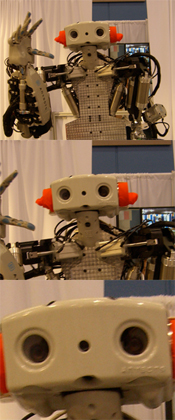This article is more than 1 year old
Scientists ponder rules and ethics of robo helpers
Anticipating mechanical cock-ups
ROTM Futurists generally agree that autonomous robots will one day helm mankind's vehicles - largely due to the idea being totally awesome, but also because jet packs and rocket cars are terribly out of fashion within the profession.

Do you trust your designated driver?
But turning the wheel over to J.E.E.V.E.S. mk. II raises serious legal and ethical concerns for the future-minded individual. For example, how does one properly scold a robot chauffeur when it runs over one's granny?
Should the autonomous system be treated as a "robotic person" or is the incident chalked up as a mechanical failure? Or perhaps the designer and programmer should be blamed for the whole mess? Certainly the guilt shouldn't fall on you - you were just along for the ride, and besides, it's so hard to find good robotic help these days.
The Royal Academy of Engineering has this speculation well at hand with a robo-report released today. Within, boffins ponder the legal, ethical, and social implications of an inevitable relinquishing of controls to autonomous systems for our roadways and health sector.
From the paper:
Some general ethical questions can be asked about the acceptability of autonomous systems. One question is: should systems be designed that cannot be shut down by a human operator? It might be thought that there is always need for human intervention, but sometimes autonomous systems are needed where humans might make bad choices as a result of panic - especially in stressful situations - and therefore the human override would be problematic. Human operators are not always right nor do they always have the best intentions. Could autonomous systems be trusted more than human operators in some situations?
One problem is there isn't a legal framework in place to deal with fatal or injurious robot goofs. The Academy says the law currently distinguishes between human operators and technical systems and requires a human agent to be responsible for an automated or autonomous system. When robots are in charge, where does the fickle finger of blame point?
For example, a failure of a surgical robot that has genuinely learnt from past use cannot be attributed to any one person. Is it therefore the case that no one can be held responsible? This has been a barrier to introducing adaptive surgical robots since the in the health sector it is usually the surgeon who has responsibility when things go wrong during a procedure.
The scientists say the issue must be addressed sooner rather than later because mechanical cock-ups will happen. The alternative is to simply hold back until such technologies are perfect - but if failures are less frequent than for human-operated systems, it's counter-productive not to introduce the technology just because the legal issues haven't been covered.
And as for autonomous vehicles, the toboggan has already left the slippery slope. "Most vehicles are controlled to a significant extent by engine management systems, drivers are reminded to close doors and put on seat belts, and many people give over responsibility of their route to GPS," the scientists point out. They say governments will need to play a larger part in controlling roadways if more autonomous systems are introduced.
In order to avoid stalling a technology that could be of significant benefit, Government should engage in early consideration of regulatory policy so that such systems can be introduced. There is also need to consider changes needed to legal frameworks that establish culpability for accidents on the road. When a driver cedes control of their car to its own navigating or driving systems, or to a centralized system controlling speed and distance between cars, they also give away some responsibility. So where would that responsibility rest in the case of an accident? Who will regulate the technology employed and how will it be certified? Will insurance companies accept the risk?
The Academy concludes that governments need to start talking robo-regulations lest we deny ourselves the future that, as mentioned before, would be totally awesome. The art of blaming others plays a key part in modern society. Today we stand on the precipice of a world where we parole our negligently homicidal Hondas for good behavior.
Check out the full report here (pdf) ®
